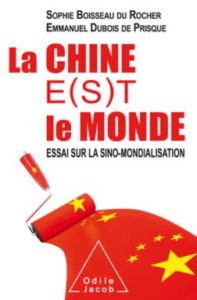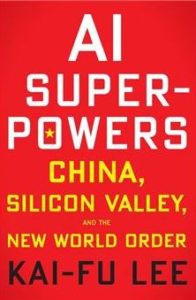💡 Does China harbour hegemonic intentions?
💡 Does China harbour hegemonic intentions?
by Lesley Brown & Joëlle Touré, Futura-Mobility
On 5 and 6 November, Futura Mobility organised a virtual conference to explore the link between innovation and China’s economic growth. This article, the first of a series of three on the topic, focuses on the issue of Chinese expansion policy, from China’s perspective.
With advances such as the rise in power in the fields of technology, science, the military, and space exploration, modern-day China has a strong international presence, including in terms of innovation. “You know, latest generation Chinese TGV [high-speed] trains owe little to our technologies. They are now being developed by the Chinese themselves,” points out Jean-Jacques de Dardel, vice-president of Xinrui Business School in Zurich, senior advisory consultant at Sinoglade, and former Swiss ambassador to China, Mongolia and North Korea.
Large takeovers of Western companies by Chinese groups are another sign of this ongoing expansion. Like the acquisition of Swiss agrochemicals group Syngenta by ChemChina for around 48 billion dollars, or that of Volvo by Geely for 1.8 billion dollars.
China’s comeback on the international scene is pretty much a given, especially in the current context, reckons Denis Jacquet, committed entrepreneur, author, and founder of the Day One movement. “It’s highly likely this Covid crisis will mark the turning point when, after five or six centuries of Western domination, China will get back the power (in competition with the US). China will emerge from it [Covid] stronger rather than weaker.”

Incisive and provocative, Denis Jacquet and Homéric de Sarthe, authors of Why your next boss will be Chinese: should we accept, negotiate or fight back? (in French only, Eyrolles 2018), take uncompromising stock of China’s economic hegemony and its impacts on our daily lives. They issue a warning : maybe we can react and turn the tide, but with less than 10 years left …
At the same time, some argue there are also signs, such as unfair trade practices or a lack of respect for intellectual property, suggesting the country is trying to impose its economy on the rest of the world while protecting its domestic market. Uber, for instance, has tried to gain a footing in China but in 2016 was more or less expelled by DiDi, the ‘Chinese Uber’.
 La Chine e(s)t le monde : un essai sur la sino-modalisation by Sophie Boisseau de Rocher and Emmanuel Dubois de Prisque (in French only, Odile Jacob 2019). Destined to be a global leader, China is looking to play a decisive role on the international scene. What is the country’s vision and how is it approaching the world and globalisation? What are the consequences for the West and Europe?
La Chine e(s)t le monde : un essai sur la sino-modalisation by Sophie Boisseau de Rocher and Emmanuel Dubois de Prisque (in French only, Odile Jacob 2019). Destined to be a global leader, China is looking to play a decisive role on the international scene. What is the country’s vision and how is it approaching the world and globalisation? What are the consequences for the West and Europe?
Yet if we look back at history, insists Mr de Dardel, unlike countries in Europe, China has never sought to be the centre of the world. “At heart, China has never developed a colonial messianism. It has never wanted to influence far-flung worlds.”
This fear of China having hegemonic intentions is fuelled by how the West itself behaved for centuries – namely by exploiting resources across the globe and imposing its lifestyles and value systems on others – suggests Mr de Dardel: “We see hegemonic desire where we recognise the origins of what shaped our own hegemonisms – Iberian, French, English, and more recently American and even Soviet.”
Admittedly the West’s fears over China’s rise to power are triggered by disparities in trade practices, but not only. China’s presence abroad troubles the West – “especially when it affects parts of the world like the Arctic, the Middle East and even Latin America that we Westerners consider our own,” insists Mr de Dardel.
China, inward-looking first
Delving into the history of China and the strategy of contemporary Chinese leaders is one way of better understanding the country’s spirit of development. Mr de Dardel believes the country has two standout features – a superiority complex and a defensive position – “with an extremely defensive vision of its place in the world … imagining that the conquerors who came from ‘outside ’ might return.”
To be sure China has long suffered foreign invasions. Nevertheless, the country has itself not behaved as an invader. The strength of Chinese civilisation lies in its ability to assimilate invaders, as was the case with the Mongols and Manchus. In the eyes of its leaders, China’s development is taking place with rather than against other countries across the globe.
All the same, despite China’s opening-up, this feeling that foreigners are a threat to Chinese culture remains. Wounds from the country’s painful past? By dominating China, the West, especially Europe, has managed to impose its power for almost five centuries! “China’s big fear over its own demographic changes is being forced to share its power and culture with people unlike itself, is having to relive the suffering of the C15th when the English and the French arrived to plunder the country,” explains Denis Jacquet. “The Chinese have a long memory. They don’t forget!” Having said that, he doesn’t see this mistrust as xenophobia but more a kind of “unity” the Party wants to maintain.
Today’s ruling Party is all too aware that its foundations, strength, and stability depend on how it responds to the primary needs of the vast Chinese population by providing essentials such as food, education and health. Just looking at its own country, vast and extremely complex, the Party clearly feels that maintaining its power is enough of a challenge. “Given the immensity of this task, the Party’s number one priority is not to change the world,” reckons Mr de Dardel. So if China does want to impose its rules, it is first of all on its own people. Hence China’s development strategy is first and foremost inward-looking.
Nevertheless, China’s modern-day economy can’t do without globalisation – which explains why Deng Xiaoping opened up the country in the 1980s. Since his reforms, tens of thousands of companies have set up in China, “including, for example, 1,000 Swiss businesses!” points out Mr. de Dardel, “whereas there are less than 100 Chinese companies currently present in Switzerland”. More recently, the Chinese government has started encouraging Chinese firms, especially private ones, to invest abroad.
“China has always sought to be respected, feared and accepted because it considers itself superior to other countries,” adds Mr de Dardel.
Is China looking to project the image of a particularly successful autocratic model? “The country likes to set a good example, yes. Especially for its own people,” reckons Mr de Dardel.
Finally, instead of ‘taking’ a place as a global superpower, isn’t China simply seeking to ‘reclaim’ the place it once occupied? Bear in mind too that for centuries, up until the C19th, it was the world’s leading economy without having colonised any other country. From this perspective, Chinese development appears as a quest for what it considers a rightful position in world history. “What would you do if you were China? Surely you would do the same?” advances Mr de Dardel.
Copy or innovate?
In Chinese culture copying is not a problem since it is seen as a necessary step towards doing better. “It’s simply a matter of copying and copying again but better, just like memorising Chinese characters,” believes Denis Jacquet. “For the Chinese, there is no such thing as imitation. It’s more about doing what someone else is doing, but better and faster. And above all, by adapting. They adapt and then send it back out to the world, as Baidu and Alibaba have done, for instance.”
 In AI Superpowers. China, Silicon Valley, and the New World Order by Kai-Fu Lee (Houghton Mifflin Harcourt 2018), Chinese entrepreneurs are like gladiators. They enter the arena knowing full well 10 out of 12 won’t get out alive, but that’s not a problem. They are going out there to do battle.
In AI Superpowers. China, Silicon Valley, and the New World Order by Kai-Fu Lee (Houghton Mifflin Harcourt 2018), Chinese entrepreneurs are like gladiators. They enter the arena knowing full well 10 out of 12 won’t get out alive, but that’s not a problem. They are going out there to do battle.
Printing, paper, the compass and gunpowder … it is also important to bear in mind that China has a history of innovation. Thus in May 2017, in his speech at the first New Silk Road Forum, president Xi Jinping retraced the history of major Chinese innovations to drive home how innovation has always been part of the country’s genetic make-up. And it seems the Chinese today are regaining this strength. For instance, China is currently leading the world in the three components of artificial intelligence (AI).
Another important point is how in China engineering and politics go hand in hand. Not only does the country produce a quarter of the world’s engineers every year, but many of them go on to work in the Chinese government or public administration. Engineers “who tend to have a vision of the future, with AI and technology in mind, and who [like Jack Ma from Alibaba and Ren Zhengfei, Huawei] play the game of GO,” says Mr Jacquet. “In GO, players encircle and build a network of influence. So [these engineer-politicians] work on the environment, infrastructure, production, sales channels and consumption.”
▶️ China: innovation and standardisation for economic growth ◀️
Which way ahead for Europe faced with China?
In our disrupted world, it is not easy for European companies to know which strategy to adopt. Taking action rather than adopting a passive stance appears the best response! Mr de Dardel advises them to take up the challenge and show their fighting spirit: “it is up to us to do better and demonstrate the ultimate superiority of democratic models!”
In addition, Mr Jacquet recommends going out to conquer the next economic development zone that is Africa. “If we bring our technologies and know-how to the African market, we can, just as China is doing, give ourselves a significant growth rebound.”
Cover photo: Andreas Schneemayer – Pixabay

